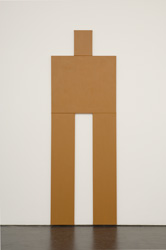A Report from the Phantom Zone: Whitney Biennial 2008
I was standing in a gallery the other day when someone walked up to me and said I had to move. He seemed very excited, so I did.
He said, "No, no, no, no, ... you're doing it wrong. Look, you have to look at the painting and then move!"
So I did.
The painting was made of thin stripes of color on sheets of glass. The sheets of glass were stacked so that when the viewer changed their perspective, different stripes of color were either exposed or hidden.
"Don't you get it? Isn't that awesome? The painting is different depending on how you look at it and everyone who is looking at it is actually seeing a different painting! So right now, you are seeing one painting and I'm seeing a different one!"
Yes, I get it.
"No, no, no ... I don't think you do. This is awesome! Don't you Realize that this is awesome?"
I get it.
He walked away exacerbated.
I knew while he was speaking at me that the painting had allowed him to realize that everyone has a different perspective and that your own perspective constantly changes as you move. He just wanted to share that realization with me. The fact that I had realized this years before without the aid of this painting and was therefore not sharing in his excitement at that moment was what pissed him off.
Explaining a moment of realization to someone else is impossible. People have to realize things for themselves or else the moment just sounds trite. I once had a teacher try to explain to me that while eating lunch one day, he just suddenly realized that eventually, he was going to die. When I did not respond with the same reverent awe that he held for his moment of realization, he started to get pissed at me and asked, "Have you ever Realized anything?"
What was I supposed to say?
Yes, after dumping a can of coke into a fish tank, I once realized that fish don't really drink the way we do.
Once, after eating some bad shellfish, I realized that I am a prisoner inside my body.
So much of talking about art is trying to explain a moment of realization.
So, much of talking about art is destined to be a failure.
How can I explain to you that Ry Rocklen's found object art in this year's Whitney Biennial is actually better than any description I can give it?
One of his sculptures appears to be a found windsock in a sand armature.
It just sounds terribly trite when written.
Even a photograph doesn't accurately describe the piece, because you have to be there to see it.
Phoebe Washburn's installation has a Gatorade irrigation system!
How can I explain that moment of realization?
Simultaneously, how can I explain exactly what it felt like when I realized how boring Joe Bradley's work in the Biennial is?
Monochrome canvases with "intentional shoddiness."
Wow. Worse than awful.
One answer for helping people Realize something about a piece of art who have not seen it seems to be to put video on the web.
Even Jerry Saltz is now doing criticism with video:

But video on the web does not seem to hold the same respect that writing does. It seems too easy to just show someone what a piece of artwork looks like. Most importantly, while video can express a great deal about it is like to encounter a piece of artwork, it still feels like a hollow experience. Even more removed to me is the experience of watching a video of the videos installed at the Whitney that was produced by the Whitney.
The best video I have seen about the Whitney Biennial 2008 is of artist and critic James Kalm getting kicked out of the exhibition. Watch it here
His video actually shows what it is like to visit an institution.
While he is video-taping the videos installed at the Whitney, the guards were video-taping him and used their video to threaten him and throw him out.
It is more of this style of video that I want to see.
Maybe with videos like James Kalm's combined with critical writing about art, the sense of what it is really like to encounter contemporary art and have a moment of realization can be better articulated.

Phoebe Washburn's mixed-media installation, (Librado Romero/The New York Times)

Joe Bradley, Animal, 2007.



1 Comments:
your guy at the gallery would clean poo himself if he read Slavoj Zizek's Parallax View,which is based off the astronomical idea of objects changing based non-traditional non-fixed and total perspective of space. Philosophically speaking, Zizek extends the idea to perception saying that cognitive parallax makes objects disappear. Imagine what that could do for your living room or foy[eyy]!! Splat, Splat!
Post a Comment
<< Home